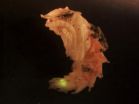(Press-News.org) (New York, March 19, 2014) – A new, non-invasive, stool-based screening test detected 92% of colorectal cancer (CRC), according to a multicenter trial published online today in the New England Journal of Medicine. The new test, which is not yet approved by the FDA, allows patients to collect a sample at home without the need for bowel preparation or diet restrictions.
Unlike other available stool-based CRC screening tests, which rely solely on detecting occult blood in the stool, this new test, called "Cologuard", developed and patented by Exact Sciences, detects both occult blood and abnormal DNA that is shed by polyps and cancers. Although a colonoscopy is the preferred CRC screening method in most of the United States, about 30-35% of individuals do not get screened. Until now, stool-based CRC screening tests that were based on detecting occult blood in the stool had many false-positives and false-negatives; not all blood in the stool is from a polyp or cancer, and not all cancers bleed enough to be detected.
"This test is done in the privacy of your home, on a single specimen, and shipped directly to the lab without the need for freezing the sample," says Steven Itzkowitz, MD, a trial investigator and Professor of Medicine and Director of the Gastroenterology Fellowship Program at the Icahn School of Medicine at Mount Sinai.
In the study, participants submitted a stool sample for a commercial occult blood fecal immunochemical test (FIT) as well as for the new multi-target stool DNA test. Everyone then had a colonoscopy as the gold-standard comparator. All enrollees were considered "average-risk", meaning they were asymptomatic men and women 50 years or older, the segment of the population recommended for colorectal cancer screening. Data published today includes that the test detected 92% of colorectal cancer in patients versus FIT's 74%. The test also detected 42% of advanced pre-cancerous lesions in patients as compared to 24% for FIT.
The test might also be useful as an 'interval' look between colonoscopies to make sure lesions are not developing before the next scheduled colonoscopy for higher-risk individuals who are advised to get more frequent colonoscopies.
Dr. Itzkowitz is on the Scientific Advisory Board of Exact Sciences Corporation.
This study was funded by Exact Sciences Corporation.
Other authors include experts from Indiana University, University of North Carolina, Mayo Clinic Rochester, MN; Kaiser Permanente Medical Center, Walnut Creek, California; Boston Biostatistics Research Foundation, Boston, MA; and Exact Sciences Corporation, Madison, WI.
The Cologuard test is limited to investigational use only and is not available for sale in the United States.
INFORMATION:
About the Mount Sinai Health System
The Mount Sinai Health System is an integrated health system committed to providing distinguished care, conducting transformative research, and advancing biomedical education. Structured around seven member hospital campuses and a single medical school, the Health System has an extensive ambulatory network and a range of inpatient and outpatient services—from community-based facilities to tertiary and quaternary care.
The System includes approximately 6,600 primary and specialty care physicians, 12-minority-owned free-standing ambulatory surgery centers, over 45 ambulatory practices throughout the five boroughs of New York City, Westchester, and Long Island, as well as 31 affiliated community health centers. Physicians are affiliated with the Icahn School of Medicine at Mount Sinai, which is ranked among the top 20 medical schools both in National Institutes of Health funding and by U.S. News & World Report.
For more information, visit http://www.mountsinai.org, or find Mount Sinai on Facebook, Twitter and YouTube.
New, noninvasive, stool-based colorectal cancer screening test
New method may increase cancer screening rate, says Mount Sinai trial investigator
2014-03-19
ELSE PRESS RELEASES FROM THIS DATE:
Work shines light on Hox genes responsible for firefly lantern development
2014-03-19
It's difficult to identify a single evolutionary novelty in the animal kingdom that has fascinated and intrigued mankind more than the lantern of the firefly. Yet to this day, nothing has been known about the genetic foundation for the formation and evolution of this luminescent structure.
But now, new work from a former Indiana University Bloomington graduate student and his IU Ph.D. advisor offers for the first time a characterization of the developmental genetic basis of this spectacular morphological novelty -- the firefly's photic organ -- and the means by which this ...
Winners and losers in globalization of world's economy, health and education
2014-03-19
Globalization has made the world a better and more equal place for many more people than was the case a few decades ago. However, it has also created two well-defined worlds of poor countries and wealthy nations, according to Vanesa Jordá and José María Sarabia of the University of Cantabria in Spain. In an article published in Springer's journal Applied Research in Quality of Life, they studied the distribution of well-being over the last wave of globalization between 1980 and 2011.
Well-being is generally described as the state of being happy, healthy or prosperous. ...
Magnetic behavior discovery could advance nuclear fusion
2014-03-19
ANN ARBOR—Inspired by the space physics behind solar flares and the aurora, a team of researchers from the University of Michigan and Princeton has uncovered a new kind of magnetic behavior that could help make nuclear fusion reactions easier to start.
Fusion is widely considered the ultimate goal of nuclear energy. While fission leaves behind radioactive waste that must be stored safely, fusion generates helium, a harmless element that is becoming scarce. Just 250 kilograms of fusion fuel can match the energy production of 2.7 million tons of coal.
Unfortunately, it ...
Increased risk of relapse omitting RT in early PET scan negative Hodgkin lymphoma
2014-03-19
Interim analysis of the intergroup EORTC-LYSA-FIL 20051 H10 trial published in the Journal of Clinical Oncology indicates an increased risk of early relapse when omitting radiotherapy in early PET scan negative patients with stage I/II Hodgkin's lymphoma. Early outcome, however, was excellent in both arms, and the final analysis should reveal whether these initial findings are maintained over time.
Dr. J.M.M. Raemaekers of the Radboud university medical center Nijmegen, The Netherlands, and central coordinator of the study says, "The standard treatment for patients with ...
Study finds forest corridors help plants disperse their seeds
2014-03-19
A forest in South Carolina, a supercomputer in Ohio and some glow-in-the-dark yarn have helped a team of field ecologists conclude that woodland corridors connecting patches of endangered plants not only increase dispersal of seeds from one patch to another, but also create wind conditions that can spread the seeds for much longer distances.
The idea for the study emerged from modern animal conservation practices, where landscape connectivity – the degree to which landscapes facilitate movement – is being used to counteract the impacts of habitat loss and fragmentation ...
Inflammation mobilizes tumor cells
2014-03-19
Researchers of Ludwig-Maximilians-Universitaet (LMU) in Munich have discovered a novel feedback mechanism that provides a mechanistic link between chronic inflammation and carcinogenesis.
Malignant tumors pose a major threat to survival largely because they shed mobile cells that can form secondary tumors in other tissues. This process requires a fundamental change in the character of cells within the primary tumor, insofar as members of a localized cell mass must be converted into actively migrating cells that invade into the surrounding tissue and blood vessels, and ...
IU, Regenstrief study: New noninvasive colorectal cancer screening tool highly accurate
2014-03-19
INDIANAPOLIS -- An Indiana University and Regenstrief Institute study of nearly 10,000 average-risk, asymptomatic men and women from 90 sites across the United States reports that a multi-target stool DNA test -- a new noninvasive colorectal cancer screening tool that has not yet been approved for sale by the Food and Drug Administration -- detects 92.3 percent of colon cancers, compared to only 73.8 percent of cancers detected by a fecal immunochemical test, the most commonly used noninvasive test today.
Study results were published online March 19 and in the April ...
Earliest evidence of limb bone marrow in the fin of a 370 million year old fish
2014-03-19
This week in the journal Proceedings of the Royal Society B, a team of French and Swedish researchers present the earliest fossil evidence for the presence of bone marrow in the fin of a 370 million-year-old fish.
Long bones, which are found in the limb of tetrapods, are not only important for locomotion and supporting the weight of the body, but also host the bone marrow. The latter plays a major role in haematopoiesis, i.e. the formation of blood cells. In a healthy adult human, about a hundred billion to one trillion new blood cells are produced every day to maintain ...
Internists must play a larger role in managing menopausal symptoms
2014-03-19
New Rochelle, NY, March 19, 2014—The number of menopausal women is projected to reach 50 million by 2020. With changing views on appropriate therapies to control symptoms and new treatments available and on the horizon, most internists lack the core competencies and experience to meet the needs of women entering menopause, according to a provocative Commentary published in Journal of Women's Health, a peer-reviewed publication from Mary Ann Liebert, Inc., publishers. The article is available free on the Journal of Women's Health website at http://www.liebertpub.com/jwh.
The ...
Genetic test could improve colon cancer screening
2014-03-19
A non-invasive test that includes detection of the genetic abnormalities related to cancer could significantly improve the effectiveness of colon cancer screening, according to research published by a team of scientists including David Ransohoff, MD, professor of medicine at the UNC School of Medicine and UNC Lineberger Comprehensive Cancer Center member. The large-scale, cross-sectional study was published online today in The New England Journal of Medicine.
The study compared two different types of tests used for screening colorectal cancer: a non-invasive, multitarget ...
LAST 30 PRESS RELEASES:
Tiny flows, big insights: microfluidics system boosts super-resolution microscopy
Pennington Biomedical researcher publishes editorial in leading American Heart Association journal
New tool reveals the secrets of HIV-infected cells
HMH scientists calculate breathing-brain wave rhythms in deepest sleep
Electron microscopy shows ‘mouse bite’ defects in semiconductors
Ochsner Children's CEO joins Make-A-Wish Board
Research spotlight: Exploring the neural basis of visual imagination
Wildlife imaging shows that AI models aren’t as smart as we think
Prolonged drought linked to instability in key nitrogen-cycling microbes in Connecticut salt marsh
Self-cleaning fuel cells? Researchers reveal steam-powered fix for ‘sulfur poisoning’
Bacteria found in mouth and gut may help protect against severe peanut allergic reactions
Ultra-processed foods in preschool years associated with behavioural difficulties in childhood
A fanged frog long thought to be one species is revealing itself to be several
Weill Cornell Medicine selected for Prostate Cancer Foundation Challenge Award
Largest high-precision 3D facial database built in China, enabling more lifelike digital humans
SwRI upgrades facilities to expand subsurface safety valve testing to new application
Iron deficiency blocks the growth of young pancreatic cells
Selective forest thinning in the eastern Cascades supports both snowpack and wildfire resilience
A sea of light: HETDEX astronomers reveal hidden structures in the young universe
Some young gamers may be at higher risk of mental health problems, but family and school support can help
Reduce rust by dumping your wok twice, and other kitchen tips
High-fat diet accelerates breast cancer tumor growth and invasion
Leveraging AI models, neuroscientists parse canary songs to better understand human speech
Ultraprocessed food consumption and behavioral outcomes in Canadian children
The ISSCR honors Dr. Kyle M. Loh with the 2026 Early Career Impact Award for Transformative Advances in Stem Cell Biology
The ISSCR honors Alexander Meissner with the 2026 ISSCR Momentum Award for exceptional work in developmental and stem cell epigenetics
The ISSCR honors stem cell COREdinates and CorEUstem with the 2026 ISSCR Public Service Award
Minimally invasive procedure effectively treats small kidney cancers
SwRI earns CMMC Level 2 cybersecurity certification
Doctors and nurses believe their own substance use affects patients
[Press-News.org] New, noninvasive, stool-based colorectal cancer screening testNew method may increase cancer screening rate, says Mount Sinai trial investigator




